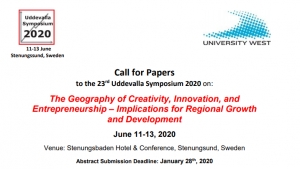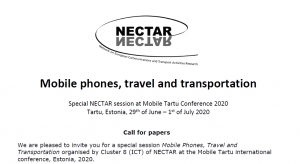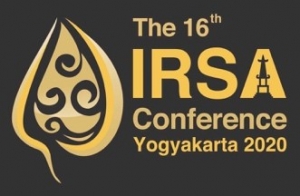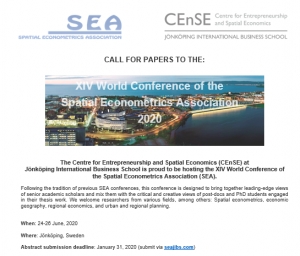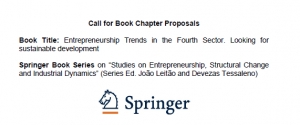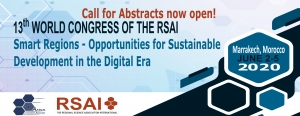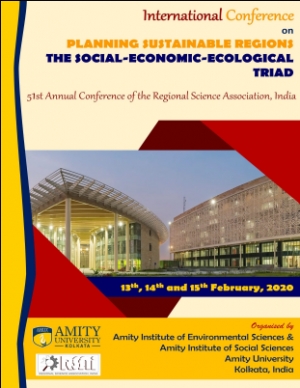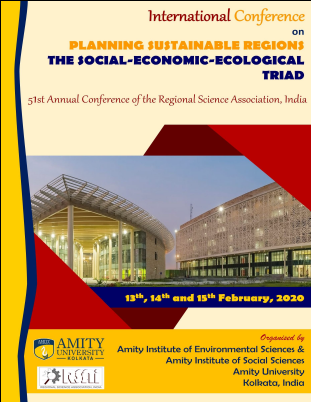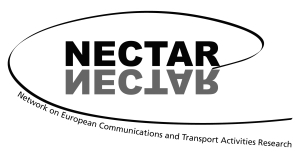Council
Elisabete Martins
CALL FOR PAPERS 23rd Uddevalla Symposium 2020 - June 11-13
Dear colleague,
We kindly invite you to submit abstracts to the 23rd Uddevalla Symposium 2020, June 11-13, 2020 on: The Geography of Creativity, Innovation, and Entrepreneurship – Implications for Regional Growth and Development. Please see attached abstract.
Venue: Stenungsbaden Hotel & Conference, Stenungsund, Sweden
Abstract Submission Deadline: January 28th, 2020 https://symposium.hv.se/symposium-2020/abstract-submission/
We are very proud to present the following eleven Keynote Speakers!
Assoc. Prof. Dr. Maria Abreu, University of Cambridge, UK
Prof. Zoltan Acs, George Mason University, USA
Prof. Sharmistha Bagchi-Sen, University of Buffalo, USA
Assoc. Prof. Tom Brökel, University of Stavanger, Norway
Prof. Susanne Durst, University West, Sweden
Prof. Maryann Feldman, University of North Carolina, USA
Prof. Nicolai Foss, Bocconi University, Italy
Dr. Sari Kerr, Wellesley College, USA
Prof. Dr. Annekatrin Niebuhr, Kiel University, Germany
Prof. Andrés Rodríguez-Pose London School of Economics, UK
Prof. Michael Storper, UCLA Luskin School of Public Affairs, USA
Please see more information in attached Call for papers and on the special sessions at the homepage https://symposium.hv.se/symposium-2020/special-sessions/
Kind regards,
Iréne Bernhard, Chair
On behalf of the Organizing Committee
06-12-2019 "The Giacomo Becattini Archive"
Organized by the Library of Social Sciences of the University of Florence under the patronage of the Department of Economics and Business Sciences of the same University
On Friday 6 December 2019 at 10.45 am "The Giacomo Becattini Archive" will be presented at the Library of Social Sciences of the University of Florence.
Speakers: Gaetano Aiello (Director of the Department of Economics and Business Sciences), Lucilla Conigliello (Director of the Library of Social Sciences), Marco Dardi (University of Florence), Maria Cristina Marcuzzo (Sapienza University of Rome), Fabio Sforzi (University of Parma).
CL 8 special session @ Mobile Tartu conference
Dear NECTAR friends,
December 1st the general call opens for the coming Mobile Tartu conference 2020. Cluster 8 will be organizing a special Nectar session (or sessions). Attached you will find the cluster 8 ICT call for this special Nectar session.
Best regards
--
Ana Condeço-Melhorado
NECTAR Secretary

CALL FOR PAPERS | 16th IRSA International Conference Yogyakarta, 13-14 July 2020
CALL FOR PAPERS
The Indonesian Regional Science Association (IRSA) in collaboration with Faculty of Economics and Business-Universitas Gadjah Mada invite scholars, practitioners, and students to submit papers to be presented in the 16th IRSA International Conference. The theme of the conference is Institutions, Human Capital, and Development. The conference will be held in Yogyakarta on 13-14 July 2020.
Potential topics to be discussed in the conference include, but not limited to:
- Institutions and economic growth
- Institutional economics of corruption and reform
- Agricultural and rural institutional development
- Property rights and innovations
- Religion and its long-term impact
- Social capital and trust
- Early childhood development and long-term outcomes
- Curriculum, pedagogy, education technology and student achievement
- Education spending and educational outcomes
- Regional disparities in educational outcomes
- Teacher labour supply and teacher incentives
- Skills development and vocational training
- Health and economic growth
- Child and mother health in developing countries
- Demand and supply of health care
Extended paper abstract of about 500 words should be submitted online via http://www.conftool.com/irsa2020 by 6 April 2020. Abstract should consist of background, data and methodology, potential contributions, and keywords. Abstracts must be submitted in English, as also the full paper.
Paper sessions are seminar-style for each paper and ample time for discussion and for participants to provide constructive feedback to authors. Paper presentations will be in English.
Important Dates
Jan 6, 2020: Abstract Submission Opening
Apr 6, 2020: Abstract Submission Deadline
May 4, 2020: Early Bird Registration Open
May 4, 2020: Notification of Abstract Acceptance
Jun 1, 2020: Early Bird Registration End
Jun 22, 2020: Full Paper Submission Deadline
Jun 22, 2020: Paper Presenter Registration Deadline
Jul 6, 2020: Non-Presenter Registration Deadline
Jul 10-11, 2020: Pre-conference training
Jul 13-14, 2020: Conference Date
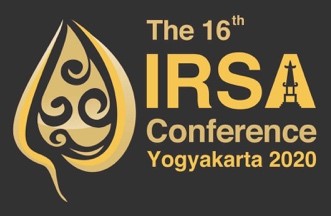 |
Conference Secretariat: Faculty of Economics and Business, Universitas Gadjah Mada Jalan Sosiohumaniora 1, Bulaksumur Yogyakarta, Daerah Istimewa Yogyakarta, 55291, Indonesia Phone : +62274548510 Fax : +62274563212 Homepage : https://yogyakarta2020.irsa.or.id |
Call for papers SEA 2020
CALL FOR PAPERS TO THE:
XIV World Conference of the Spatial Econometrics Association 2020
The Centre for Entrepreneurship and Spatial Economics (CEnSE) at Jönköping International Business School is proud to be hosting the XIV World Conference of the Spatial Econometrics Association (SEA).
Following the tradition of previous SEA conferences, this conference is designed to bring together leading-edge views of senior academic scholars and mix them with the critical and creative views of post-docs and PhD students engaged in their thesis work. We welcome researchers from various fields, among others: Spatial econometrics, economic geography, regional economics, and urban and regional planning.
When: 24-26 June, 2020
Where: Jönköping, Sweden
Abstract submission deadline: January 31, 2020 (submit via seajibs.com)
Keynote speakers (additional keynotes will be announced shortly):
Xiaodong Liu, University of Colorado Boulder
Andrés Rodríguez-Pose, London School of Economics
Publications: Papers presented at this conference will be considered for publication in a special issue in the Journal of Spatial Econometrics.
Jean Paelinck Prize for Young Researchers: The prize is established to recognize and honour the outstanding career and contributions of Professor Jean Paelinck, an internationally recognized spatial econometrician of outstanding merit, who is viewed as one of the founders of the field of spatial econometrics. The Jean Paelinck Prize for Young Researchers aims to recognize the research of junior scientists in Spatial Econometrics through paper presentation and in-depth discussion. Upon acceptance, competing papers will be presented in the Jean Paelinck Sessions, where the young researchers will be given extra time for presentation and receiving feedback. Every paper will be assigned to a discussant, and the sessions will be chaired by senior scientists. The winner will receive 300 Euros. All accepted papers will benefit from a reduced registration fee to the conference.
Sceintific committee:
Giuseppe Arbia, Catholic University of the Sacred Heart
Anil Bera, University of Illinois
Roger Bivand, Norwegian School of Economics
Jean Paul Elhorst, University of Groningen
Bernard Fingleton, University of Cambridge
Lung-Fei Lee University, Ohio State University
Julie Le Gallo, Agrosup Dijon, University Bourgogne Franche-Comté
Gianfranco Piras, Catholic University of America
Yang Zhenlin, Singapore Management University
Jönköping is conveniently located between Stockholm, Gothenburg, and Malmö/Copenhagen. The city is beautifully situated along the southern shore of lake Vättern. With its international university and 140,000 inhabitants, Jönköping is full of life all year round. The interest in food is great in the city where you will find a variety of restaurants and cafés. For nature lovers and botanists, the region is a paradise with nature reserves, hiking trails, lovely views and one of Sweden’s largest oak forests
The overall mission of CEnSE is to organize, support, and carry out innovative, high-quality, basic, applied as well as policy relevant research on entrepreneurship and spatial economics. For more information about CEnSE, please visit our website: center.hj.se/cense
More information about the conference, Jönköping, CEnSE, the Journal of Spatial Econometrics, Jean Paelinck Prize for Young Researchers etc. can be found on: seajibs.com
WE HOPE TO SEE YOU IN JÖNKÖPING!
Professor Johan Klaesson (Director of CEnSE)
Associate Professor Mikaela Backman (Co-director of CEnSE)
Assistant Professor Sofia Wixe (Co-director of CEnSE)
Sofie Grahnat (Administrator of CEnSE)
Call for Book Chapter Proposals - Entrepreneurship Trends in the Fourth Sector. Looking for sustainable development
Call for Book Chapter Proposals
Book Title: Entrepreneurship Trends in the Fourth Sector. Looking for sustainable development
Springer Book Series on “Studies on Entrepreneurship, Structural Change and Industrial Dynamics” (Series Ed. João Leitão and Devezas Tessaleno)
Synopsis:
Sustainable entrepreneurship is not an option anymore. Today´s traditional economic systems and business models have become outdated. Although tremendous progresses have been made by Corporate Social Responsibility (CSR) interventions from public, private and non-profit organizations, the scale and urgency of the world´s biggest challenges have grown at an alarming rate. The general call for action represented by the Sustainable Development Goals (SDGs) needs new entrepreneurial ventures.
The four sector is a relatively new sector that consists of for-benefit organizations that combine market-based approaches of the private sector with the social and environmental aims of the public and non-profit sectors. To indicate new types of social entrepreneurial activities that do not neatly fall into the traditional sectors, the concept of fourth sector has been introduced in different streams of academic research. The examples of entrepreneurship in the fourth sector represent new ways, in which societies address wicked problems.
This book aims to examine how entrepreneurial ventures serve for people expressing themselves and take part in societal processes of change. An important aspect is that such activities fall outside the traditional sectors, public, private or non-profit. This book will show trends in entrepreneurship in the fourth sector, will describe specific ecosystems fostering new ventures around the world and will characterize the most common and innovative business models, successful experiences and paradigmatic examples. The book wants to cover as well the main effects, among others, of technological change, innovation and institutional behavior on the fourth sector in the last years. It aims to address the main characteristics and driving forces of this phenomenon, the strategic business practices and the role of the social entrepreneurship in attaining a more harmonious and sustainable development.
In particular, this book will serve for exploring and discussing innovative studies, analyses and reports as key developments such as new business models, social innovations, marketing and strategy, urban activism, social movements, governance issues and options emerging along the fourth sector. The book embraces the emerging social and sustainable entrepreneurship phenomenon, with focus on urban and regional entrepreneurial ecosystems and structural change in society for a better future.
We welcome book chapter contributions centered (but not exclusively) on the following themes:
- Entrepreneurship opportunities in the Fourth Sector.
- New Business Models in the Fourth Sector.
- Social innovation in the Fourth Sector
- Social or Cause Marketing and strategies in the Fourth Sector.
- Entrepreneurial case studies and paradigmatic examples.
- Hybrid organizational configurations, Social Enterprises, B Corporations.
- Microfinance, venture philanthropy, sustainable business.
- Civic/Municipal Enterprises, Consortia, Cross-sectional Partnerships.
- Community Interest Companies, Cooperatives, Community Wealth Organizations.
- Common Good Corporations
- Tensions of a public-private hybrid organization, and the role of the individual.
- Kinds of governance issues and options emerging along the Fourth Sector.
- Urban activism, social movements, smart cities and structural changes.
- Self-organized civic activism and sustainable development goals.
- Migrants and refugees´ entrepreneurship in the Fourth Sector.
- One-to-one aid, volunteering, community participation, social cooperation, networking.
- Gender equality, female leadership and the Fourth Sector's focus on women.
- Entrepreneurial Ecosystems and regional development.
- Innovation, technology and digital economy in the Fourth Sector.
- The future
Important Dates:
January 15, 2020: Book Chapter Proposal
February 14, 2020: Accept/Reject Notification
April 15, 2020: Full Chapter Submission
May 15, 2020: Review Results Returned
June 15, 2020: Final Chapter Submission
October 31, 2020: Final Print Version Available (Tentative)
Submission Procedure:
Chapter proposal submissions are invited from researchers and practitioners on or before January 15, 2020. Proposals should be limited to between 1000- 2000 words, explaining the mission and concerns of the chapter and how it fits into the general theme of the book.
Only electronic submissions in PDF or Word format will be considered. Please send your proposal to the following emails (or one of them):
This email address is being protected from spambots. You need JavaScript enabled to view it. This email address is being protected from spambots. You need JavaScript enabled to view it. This email address is being protected from spambots. You need JavaScript enabled to view it. This email address is being protected from spambots. You need JavaScript enabled to view it. This email address is being protected from spambots. You need JavaScript enabled to view it.
Your submission must be made on or before the due date specified. Submissions will be reviewed in a single-blind manner. We look for multiple perspectives on the fourth sector topic.
Notifications regarding the status of the chapter proposal will be made available to authors by 14 February, 2020.
Based on accepted chapter proposals, chapter submissions will be accepted on or before 15 April, 2020. Two or more reviewers will review all submitted chapters.
Chapter submissions must be prepared in accordance with the submission guidelines (see series webpage: http://www.springer.com/series/15330) and must not exceed 25 pages, including bibliography and any appendix. Only electronic submissions in PDF or Word format will be considered.
Book Editors:
- M. Isabel Sánchez-Hernández, University of Extremadura, Spain
- Luísa Carvalho, Politechnic Institute of Setubal & CEFAGE, Portugal
- Conceição Rego, University of Évora & CEFAGE, Portugal
- Maria Raquel Lucas, University of Évora & CEFAGE, Portugal
- Adriana Backx-Noronha, University of São Paulo, Brazil
NEW DEADLINE (21 January 2020) Call for Abstracts and Special Session Proposals for RSAI Congress 2020
Call for Abstracts and Special Session Proposals
We are delighted to announce that the Call for Abstracts and Special Session Proposals for RSAI Congress 2020 was extended until January 21, 2020!
The Regional Science Association International (RSAI) and the Moroccan Regional Science Association (AMSR) invite regional scientists, economists, economic geographers, urban planners, policy makers, and researchers of related disciplines to participate in the 13th World Congress of the Regional Science Association International, with the main theme "Smart Regions – Opportunities for sustainable development in the digital era". The Congress will be hosted by the Moroccan Regional Science Association.
We invite formal paper presentations and Special Session Proposals (deadline of January 21, 2020). The abstract submission portal is now open. Full information on the venue, abstract submission, registration, schedule of events, accommodation and travel information is posted at https://www.regionalscience.org/2020worldcongress
About the Focal Theme
The congress is open for the world-wide diverse audience of regional scientists including academics, policy makers and practitioners and aims to bring together the key elements of multidisciplinary regional science research and to provide a scientific platform for presenting and discussing research at the frontiers of the spatial sciences in a broad sense. The themes which will be addressed zoom in particular on the pressing challenges of meeting the 2030 Agenda of Sustainable Development Goals, in both developed and developing economies. As a new challenge to regional science research is formed by the emerging digital technology and its implications for analysis, monitoring, evaluation and forecasting spatial dynamics at all levels, the theme chosen for the congress is ‘Smart Regions- Opportunities for Sustainable Development in the Digital Era’. Therefore, the potential of spatial and temporal big data, machine learning, artificial intelligence, social media information, and of the new spatial maps emerging from digitization and robotization will be addressed by the congress as well, as these forces will have far-reaching impacts on human behaviour and interaction in space. Topics such as urban-rural development, migration, spatial and resources (al)location, border effects, urbanization, sustainable cities, mobility, land use, environmental quality, disaster management, energy transition, culture, poverty, segregation, spatial modelling are important issues covered in the 2020 RSAI World Congress.
Themes of specific interest are:
RS01 - Entrepreneurship
RS02 - Infrastructure, transportation and accessibility
RS03 - Knowledge and innovation
RS04 - Local finance
RS05 - Location theory and applications
RS06 - Methods in Regional Science and Urban Economics
RS07 - Migration and regional labor markets
RS08 - Real estate and housing
RS09 - Regional and urban policy
RS10 - Regional development
RS11 - Rural development
RS12 - Spatial implications of climate and environmental change
RS13 - Spatial planning
RS14 - The spatial dimension of sustainable development
RS15 - Theoretical and empirical urban economics
RS16 - Tourism
RS17 - Globalization and territorial intelligence
RS18 - Resilience and Risk Management
RS19 - Green economy and complexity of socio-ecosystems
RS20 - Biodiversity, ecosystems and ecosystem services
RS21 - Agriculture, fisheries and food security
RS22 - Nexus: water, agriculture and energy
We look forward to welcoming you in the dazzling city of Marrakech in June 2020.
With warmest regards,
The Organizing Committee
|
Abstract/Paper Submission: Deadline for Abstracts submissions: January 21, 2020. Abstracts should be submitted electronically, using the platform available on the Conference website: https://events.digitalpapers.org/rsai2020 Visit the RSAI Congress website, www.regionalscience.org/2020worldcongress, and follow the abstract submission instructions. Please note, there is a limit of two paper presentation per paid, registered participant. Special Session proposals: Deadline for Special Session proposals: January 21, 2020. Proposals should be sent by email to the secretariat of the Congress (This email address is being protected from spambots. You need JavaScript enabled to view it.). |
Call for Submissions: PRSCO Award for Best Paper by a Young Regional Scientist
Call for Submissions
PRSCO Award for Best Paper by a Young Regional Scientist
http://www.prsco.info/PRSCOAwards.html
The Pacific Regional Science Conference Organization (PRSCO) offers a Best Paper Award annually. The Award is aimed at encouraging young regional scientists within the Asia-Pacific region to participate in research within the PRSCO community and to achieve research excellence. PRSCO now invites submissions for the 2019 Award.
The Award will be made for the best submission to the PRSCO Best Paper competition by a young regional scientist, under the age of 35 (on December 31, 2019), who is from a PRSCO-relevant part of the world. The Award rules can be found on the PRSCO web site.
Papers submitted for the Best Paper Award should either have been presented to the PRSCO Summer Institute held in Bangkok in July 2019, or be planned for presentation at the PRSCO/WRSA Conference to be held in Waikiki, Hawaii, March 18-21, 2020. Papers will be assessed by a PRSCO Best Paper Selection Committee and the author of the winning paper is expected to be notified by January 24, 2020. The decision of the Selection Committee will be final.
Eligible authors who wish to submit a paper to the PRSCO Best Paper competition should email a pdf copy of their paper to the PRSCO Executive Secretary, Hiroyuki SHIBUSAWA, This email address is being protected from spambots. You need JavaScript enabled to view it., by no later than Friday, November 29, 2019.
Submissions should include a cover page with the paper’s title, the author’s full name, affiliation, and contact details. Award applicants should either: state that the paper is single-authored; or provide the name of the co-author(s), together with evidence that the applicant is the lead author and has contributed over 70 per cent of the paper’s content. The applicant should also affirm that they meet the Award’s age criterion.
PRSCO Award for Best Paper by a Young Regional Scientist
List of Winners
2015 Andrés Castaño Zuluaga (the Catholic University of the North at Antofagasta, Chile)
Paper Title “The Effect of the Spatial Density of Firms on Gender Wage Gap”
2016 Maria IKEGAWA (Policy Research Institute, Ministry of Agriculture, Forestry and Fisheries, Japan)
Paper Title "Location Choice for Japanese Frozen Food Industry in East Asia Using Domestic and
Foreign Market Access with the Penetration Rate of Refrigerators"
2017 Juan Soto (Universidad Cat´olica del Norte)
Paper Title “Cities, Wages, and the Urban Hierarchy”
2018 Camila Alvayay (Universidad Católica del Norte)
Ppaper Title “Housing Demolition and Property Tax Delinquency: Evidence from Detroit”
51st RSAIndia Conference | 13-15 February, 2020, Kolkata, India
Dear Colleagues and Friends,
Greetings from Amity University, Kolkata and RSAi !!
We are pleased to announce the upcoming 51st annual conference of the Regional Science Association, India. The Amity Institute of Environmental Sciences and Amity Institute of Social Sciences of Amity University, Kolkata, India is going to organize an international conference on Planning Sustainable Regions: The Social-Economic-Ecological Triad during February 13-15, 2020. Kindly find the attached first circular of the conference. We are appreciating your active participation in the said event. Kindly ensure wider circulation of the news among your colleagues, friends, teachers, and students.
Looking forward to meet you at Kolkata. Feel free to contact us.
Thanking You,
With warm regards
--
Organising Committee,
International Conference on
Planning Sustainable Regions: The Social-Economic-Ecological Triad
Amity University, Kolkata
February 13-15, 2020
51st Annual Conference of the Regional Science Association, India
More information: http://www.rsai.org.in/
Next NECTAR workshops
Dear NECTAR friends,
Please find bellow two call for papers for the next NECTAR workshops:
* Cluster 2 and 7: "Social and Health Implications of Active Travel Policies”, Venice, Italy, 26-27 March 2020
* Cluster 5 and 6: "Regional Science and Tourism", Special Session for WRSA-PRSCO of RSAI 2020, Waikiki, Hawaii USA March 18-21, 2020
Best regards
--
Ana Condeço-Melhorado
NECTAR Secretary
About Us
The Regional Science Association International (RSAI), founded in 1954, is an international community of scholars interested in the regional impacts of national or global processes of economic and social change.

